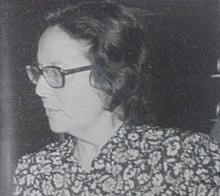Gladys Adda
Gladys Adda (born June 2, 1921 in Gabès , French North Africa as Gladys Scialom , † 1995 ) was a Tunisian women's rights activist and journalist . She is best known for her activism during the Tunisian struggle for independence and her commitment to an education for girls.
Life
Youth and education
Gladdys Scialom was born on June 2, 1921 in the southern Tunisian city of Gabès , then part of the French colony of North Africa . Part of her family were North African Jews who originally lived in Batna (now Algeria ). Her maternal grandfather had left French Algeria to try his luck in what is now Tunisia, where he opened a small hotel, among other things. Scialom's mother already enjoyed a school education, which was very unusual for the social conditions at the time. All the more, her parents encouraged Gladys Adda to attend school.
She first attended a primary school for girls before moving to a mixed secondary school for boys and girls. Despite the progressive attitude of her parents, she had to give up her education at the age of 15 and marry a man of Jewish faith from Gabès who was twelve years older than her.
Engagement in the struggle for independence
After seven years of marriage, Gladys Scialom decided to separate at the age of 22 in order to move to Tunis and work there with her friend Bice Slama , also a politically active Tunisian Jewish woman. At that time, from 1942 to 1943, German and Italian forces occupied Tunisia before Allied forces pushed them back (see French North Africa in World War II ). Among other things, Adda distributed leaflets against the German occupation and against the colonization of Tunisia in general. In 1943 she joined the Tunisian Communist Party because she wanted to do more for the rights of women and workers and against fascism. Together with her friend Slama, she also distributed newspapers to workers in factories in order to sensitize them to the political situation and to motivate them for labor disputes.
In 1944, Scialom and other women founded the Union des Femmes de Tunisie (UFT for short, German Tunisian Women's Union), and the Muslim Tunisian Nabiha Ben Miled was elected first chairman. At the same time she also met her second husband, Georges Adda , whom she later married, took his name and with whom she had twins. Sensitized to the needs of a mother and because of her political attitudes, she was particularly committed to school education for girls in the UFT. In the intensifying anti-colonial movement in Tunisia, Adda's husband was imprisoned for his anti-colonial activities. The Adda couple were considered to be one of the politically “most prominent” of the Tunisian independence movement.
After Tunisia soon became independent in 1956, the UFT increasingly focused on neighboring Algeria - also colonized and occupied by France to date - in which a brutal war between the colonial power and Algerian resistance groups was taking place. Adda and other women organized medical and financial support for Algerian women and children as part of the UFT.
After independence
The independence of Tunisia also changed Adda's life. Numerous Jews left the country and migrated either to France or to the newly founded state of Israel. However, Adda and her husband stayed in Tunisia, which they referred to as their homeland. Professionally, she switched to the Tunisian National Bank (Banque Centrale de Tunisie) , where she worked until her retirement in 1981. Politically, Adda withdrew from the communist party. In the course of her life she was still involved in the Tunisian section of the human rights league ( Ligue des droits de l'Homme ) and lectured at universities in Tunis.
Glady Adda died in 1995 at the age of 74; According to a newspaper report, she is said to have given her body to science after death. Her husband, Georges Adda , died in 2008. One of their two sons, Serge Adda (1948–2004), was a well-known businessman in Tunisia and president of TV5 Monde .
bibliography
- Souad Triki: Gladys Adda: 'Je reste Optimiste' , pp. 51–77, in: Habib Kazdaghli (ed.): Mémoire de femmes: Tunisiennes dans la vie publique, 1920–1960 , Éditions Média Com, Tunis 1993
Individual evidence
- ↑ Tunsian Women Yesterday And Today. In: Women of Tunisia. Retrieved January 27, 2018 .
- ↑ a b c Célébrer l'absence… Georges parmi nous. In: La Presse de Tunisie. September 28, 2016, accessed January 27, 2018 (French).
- ^ Sana Ben Achour: Tunisie: Femmes tunisiennes célébrent la promulgation du Code du statut personnel en août 1956. In: Women Living Under Muslim Laws. Association tunisienne des femmes démocrates, 13 August 2010, accessed on 27 January 2018 (French).
- ↑ a b c d e f Julia A. Clancy-Smith: Adda, Gladys . In: Emmanuel K. Akyeampong and Henry Louis Gates, Jr (Eds.): Dictionary of African Biography . Oxford Press, Oxford 2012, ISBN 978-0-19-538207-5 , pp. 88 .
- ^ Georges Adda, militant tunisia (album photos) . In: Leaders . ( com.tn [accessed January 27, 2018]).
| personal data | |
|---|---|
| SURNAME | Adda, Gladys |
| ALTERNATIVE NAMES | Scialom, Gladys |
| BRIEF DESCRIPTION | Tunisian women's rights activist and journalist |
| DATE OF BIRTH | June 2, 1921 |
| PLACE OF BIRTH | Gabès , French North Africa |
| DATE OF DEATH | 1995 |
